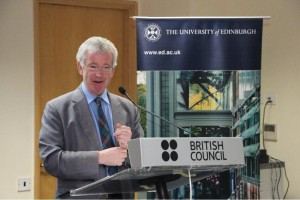7th March 2014 New Delhi, India
Interview with Prof Sir Timothy O’Shea, Principal and VC of University of Edinburgh
Professor Sir Timothy O’Shea, Principal and Vice-Chancellor of the University of Edinburgh, was in Bangalore last week. I caught up with him in the margins of an alumni event he was hosting at the British Library.
 Welcome to India, can I ask why you’re here?
Welcome to India, can I ask why you’re here?
Specifically, my visit coincides with a five day conference in Bangalore on animal health and welfare, which has been jointly organised by ourselves and the Commonwealth Vet association. There are dozen academics here from the Royal (Dick) School of Veterinary Studies and from the world-famous Roslin Institute. The latter was responsible for the creation of the world’s first cloned mammal, Dolly the sheep. More generally, I am in India to help Edinburgh build successful partnerships and do great research through those partnerships. On my first visit to India, I visited the computer science department at IIT-Bombay and was knocked out by the creative quality there – as good as anything in California.
A good example of the kind of partnership we’d like would be similar to our relationship with NCBS on neurodegenerative disease. This week that took the next step with the opening of the Centre for Brain Development and Repair, which will see very distinguished scientists from Edinburgh coming over to work alongside their excellent colleagues in Bangalore and students will study for joint PhDs, awarded by both centres.
What would be your advice to an Indian academic looking to partner with Edinburgh?
Your first point of contact should be our office in Mumbai. We’re keen to build real and lasting partnerships in India and that’s what our office has been tasked with delivering. I want them to be reaching out to important centres in India. We also have centres in China and Latin America and will open one in North America later this year. Their efforts are supported by colleagues back in Edinburgh, who help connect with people across the University.
What are you looking for in Indian partners?
We’re looking for excellence in research and that’s the bottom line. Part of my job is to boast for the University of Edinburgh, which is easy – it’s an excellent place. We’re looking to build sustainable and bilateral partnerships with the best researchers in India.
Edinburgh is obviously very well known. Can you tell us something people might not have heard about the city or university?
Where to start? (thinks) Edinburgh is well known for the quality of its scientific research but Indians may not know about our Centre for South Asian Studies and, soon to open, India Institute. We have world-leading researchers studying Indian culture, language (including Sanskrit), politics and history. The weather is also much warmer than you might fear – we are on the same latitude as St Petersburg but the Gulf Stream means we get much less cold weather. You may know that Edinburgh plays host to the biggest arts festival in the world in August (during which, the city’s population doubles). We also have an annual Asian cultural festival, the Mela which is an ideal place to try a unique Scottish take on Indian cuisine – the Haggis Pakora.
Professor Peter Higgs, who studied and taught physics at Edinburgh, won the Nobel Prize for Physics in 2013 for his work in discovering the Higgs boson.. Can you tell us how the University is building on his achievement?
We’ve established the Higgs Centre for Theoretical Physics, which will create an environment in which scientists and industry players from around the world can share and develop ideas, and apply novel mathematics and computation to tackle some of the 21st century’s great challenges. We’ve also launched a free course for anyone interested in learning more about Peter’s work. You can sign up for this Massive Open Online Course here.
Final question, what’s coming up in Edinburgh that we should be keeping an eye on?
There’s a lot going on! We recently established the National Avian Research Facility (NARF) which will provide a resource for both UK and international researchers studying chicken health and disease at the Roslin Institute. Bird health is a big issue – there are 10 chickens for every human on the planet and it’s the dominant source of meat in our diets. We’ve got the Edinburgh Centre for Carbon Innovation. Then there’s Flowave TT – a centre to test marine energy devices with a unique circular tank. Finally we’ve had a lot of success installing supercomputing capacity in Edinburgh, where we’re moving from the peta- to the exa-scale! We’re proud of the University’s contribution to supercomputing, particularly as we trained Thomas Bayes, whose work on statistics underpins the technology. Edinburgh has just taken delivery of one of the most powerful computers in the world, named ARCHER. Innovation has a bright future at the University of Edinburgh!